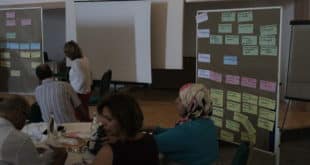Normally when we plan something, a trip, a holiday, a project, the first thing we do is to buy tickets, book the museum, define activities, read about the places we are going to visit, find out about the weather, etc. It’s hard to imagine that the first thing we do …
Read More »Felipe Nitsche
What is a theory of change?
By reading this article, you will get a general idea of what is meant by the theory of change and what specific vocabulary is used. What is a theory of change? A Theory of Change (ToC) of a project describes why change is needed and how it will happen. In …
Read More »5 Steps to hire a project evaluation consultant
In this article you will learn which steps to follow to choose and hire a project evaluation service. Dual perspective of evaluation The objective of a project evaluation is to make a judgment on the success or failure of an intervention considering its adaptability, effectiveness, efficiency, relevance, coverage, impact, sustainability …
Read More »[Downloads] A List of templates for international development and aid professionals
A template is a predesigned document you can use to create documents quickly without having to think about formatting. Here is a list of templates international development and aid professionals frequently use in their work. Budget template: the Budget represents the conversion of project activities into monetary values. It is …
Read More »Means of Verification: What it is and how to use it
In the last article we anticipated that the means of verification would help us to measure the effective fulfillment of the indicators. If you remember, we wanted to know whether the teachers who had participated in the training had indeed increased their knowledge. What are the means of verification used …
Read More »Results Indicators: What they are and how to use them
Results indicators define essential characteristics of the outcome-based objectives of the project (an outcome-based objective, also known as result, is a statement of the effect that a project has on the community). These characteristics ensure that the project’s outcome-based objectives are “S.M.A.R.T.” (Specific, Measurable, Achievable, Relevant and Time-bound). Results indicators …
Read More »Most Significant Change: What it is and how to use it
The Most Significant Change (MSC) tool is a qualitative participatory monitoring and evaluation technique. Normally when we think of project evaluation, we think in terms of measuring the achievement of indicators that are expressed through numbers and percentages. For example, it is typical to read in an evaluation that “40% …
Read More »What do you do during the identification-phase of the project cycle?
In the identification stage, we have to define the basic lines of a project among all the parties involved, based on a joint analysis of felt needs and a commitment on the intervention strategy to be followed to meet these needs. Development projects must first and foremost address “priority felt …
Read More »What is the logical framework approach?
In the field of international development, specific methods and approaches are used to plan a cooperation intervention. Many of them have been developed for the particular needs of donors. In this article, we briefly present the most widely used results-based approach: the logical framework approach. Where is the “logic”? The …
Read More »The 4 phases of the project cycle
Professional project management is a cyclical activity. Running a project efficiently and effectively is commonly called “Project Cycle Management” or PCM. Planning, implementation and monitoring as well as reviews and evaluations are always based on the results framework described in the Logical Framework Matrix. The Project Cycle Management is the …
Read More »










